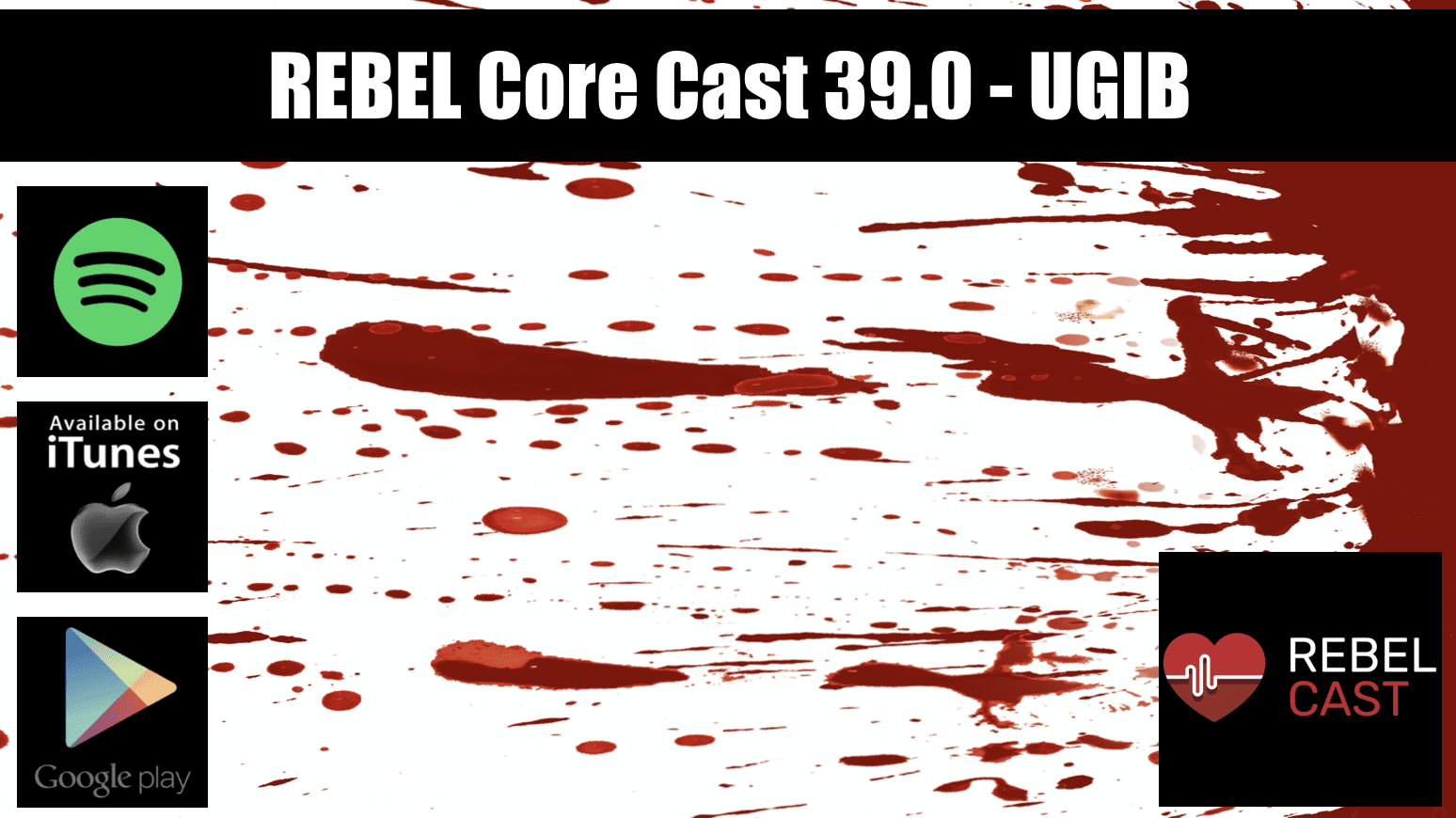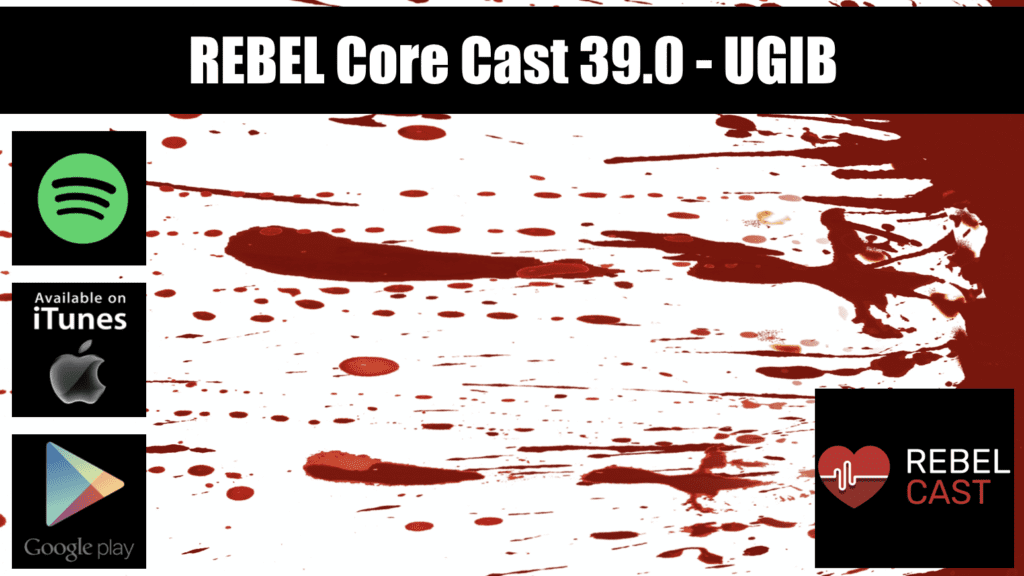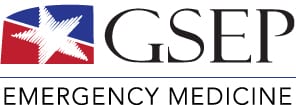
- Focus on resuscitating well by focusing on the basics
- Recognize Massive GIB (MGIB) with a thorough exam of the patient and vital signs (Shock index >0.7 is ABNORMAL and signals impending shock)
- Obtain large bore PIV access and prioritize transfusion over crystalloids for MGIB
- Get consultants on board early
- Give adjunctive medications that impact mortality (ie A 3rd generation cephalosporin in patients with variceal bleeding or a history of cirrhosis)
REBEL Core Cast 39.0 – Upper GI Bleed
Definition and Recognition of Massive GI Bleeding (MGIB)
- Not one consensus definition exists
- Any bleeding from the GI tract (upper or lower) that results in
- Hemodynamic instability (hypotension, dysrhythmias)
- Poor perfusion (AMS, syncope, pallor, delayed capillary refill, decreased pulses)
- Overt and rapid bleeding
- Transfusion of ≥2 units pRBC in initial resuscitation
- Spend time at the bedside looking for these things
- AMS
- Skin temperature, color
- Pallor
- Mottling
- Capillary refill
- Vital signs
- Hypotension
- Hypoxia
- Shock Index (HR/SBP)
- > 0.7 is ABNORMAL
- > 1.0 may signal a need for massive transfusion
- Characteristics that may predict the need for immediate intervention
- UGIB
- Tachycardia (LR 4.9)
- Syncope (LR 3.0)
- Hx of malignancy or cirrhosis (LR 3.7)
- NG lavage returning BRB (LR 3.1)
- LGIB
- Similar for LGIB
- Tachycardia
- Syncope
- HD instability
- Active rectal bleeding
- Non-tender abdominal exam
- ASA use
- Hx/o renal failure, liver failure, malignancy
- UGIB
- A NORMAL HR is predictive for a NON-massive GIB
- Check if patient is on a BB or CCB that may mask tachycardia
- Localizing the bleed
- Hematemesis
- UGIB
- Melena
- Usually UGIB or
- Proximal LGIB
- Hematochezia
- Usually LGIB or
- Brisk UGIB (very sick patients!)
- Hematemesis
Basic Resuscitation First!
- Reliable peripheral IV access
- Short and fat lines!
- IO if peripheral fails
- Blood > crystalloid
- Reverse anticoagulants
- Secure the airway if needed
- Get your consultants on board early (endoscopy/GI, surgery)
Adjunctive Medications
- Proton pump inhibitors (PPI)
- Cochrane Review
- No effect on mortality, rebleeding, need for surgery
- Decrease high risk stigmata in patients with peptic ulcer disease (PUD)
- Bottom line: Doesn’t affect mortality so don’t prioritize during the initial resuscitation. May give bolus after.
- Cochrane Review
- Octreotide
- Somatostatin analog, vasoconstricts the splanchnic circulation
- No effect on mortality in undifferentiated GIB
- However, can decrease
- Initial bleeding
- Total transfusion
- Need for surgery
- Bottom line: Doesn’t affect mortality so don’t prioritize during the initial resuscitation. May give bolus + infusion after.
- TXA
- Reduces the breakdown of fibrin clots, fibrinogen, and other plasma proteins
- Recently published HALT-IT Trial provided good quality evidence
- No difference in 5 day mortality due to bleeding
- There WAS an increase in VTE (adverse events)
- Bottom line: Not recommended to give routinely
- If TEG/ROTEM demonstrates excessive fibrinolysis then TXA would be indicated
- Antibiotics – Cephalosporins!
- Decreases mortality in patients with variceal bleeding or undifferentiated bleeding in patients with cirrhosis
- These patients are immunocompromised at baseline and GI bleeding puts them at risk for subsequent sepsis
- 3rd generation cephalosporin
- Ceftriaxone 1 gram
- Cefotaxime 2 grams
- Decreases mortality in patients with variceal bleeding or undifferentiated bleeding in patients with cirrhosis
Take Home Points:
- Focus on resuscitating well by focusing on the basics
- Recognize MGIB with a thorough exam of the patient and vital signs (Shock index >0.7 is ABNORMAL and signals impending shock)
- Obtain large bore PIV access and prioritize transfusion over crystalloids for MGIB
- Get consultants on board early
- Give adjunctive medications that impact mortality (ie A 3rd generation cephalosporin in patients with variceal bleeding or a history of cirrhosis)
Post Peer Reviewed By: Salim R. Rezaie, MD (Twitter: @srrezaie)
Cite this article as: Anand Swaminathan, "REBEL Core Cast 39.0 – Upper GI Bleed", REBEL EM blog, September 2, 2020. Available at: https://rebelem.com/rebel-core-cast-39-0-upper-gi-bleed/.




